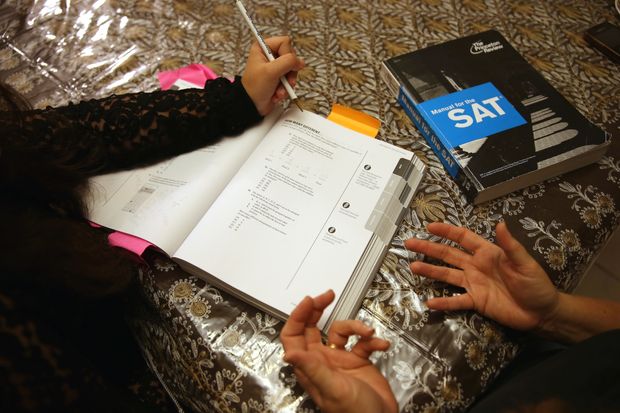|
We spoke with Mary Bridges, A-List Education’s Director of Partnership Operations and Success. She gave us some amazing insight into A-List’s work with their partners; please note that A-List also offers tutoring in a one-on-one setting with tutors that get the same type of training with the same kind of flexibility in lessons. 1. Can you introduce A-List Education? A-List is an education company focusing on test prep and college access. We work with students and families of all circumstances through online and in-person private tutoring as well as A-List instructor-led classrooms in schools, non-profits, and community-based organizations. I work with our Partners, Program Managers, and Educators making sure that our classes are efficient, entertaining, and successful. 2. What is your tutors’ selection and training process? Our tutors are selected after a rigorous application process including phone interviews, a full-length SAT practice test, and a live demonstration where the Institutional staff members role-play by invoking the spirits of the students we serve. It’s a lot of fun, and it keeps the teachers on their toes from the start! Once an educator is hired, they undergo extensive training in content, strategies, and classroom management with some teaching philosophies peppered in along the way. They are asked to complete demos each week, and just like our students, they are assigned homework to complete after most lessons. 3. How are the classes structured? Do you use specific materials? Our classes are structured for maximum student engagement and teacher freedom to tailor the lessons specifically for each class. We have lesson plans and a general guideline to follow for the entire course, but teachers are encouraged to linger or skip material depending on each class’s strengths and weaknesses. We have our own Book of Knowledge that each student receives, either in physical form or an ebook for our online classes. The Book of Knowledge comes complete with entertaining explanations, examples, and drills. Our teachers also have slides available to them so students have multiple visuals for each topic. We also provide three full length practice tests, with teacher review, to measure student improvement throughout the course. 4. How did you adapt to the pandemic-related challenges? The pandemic caught our attention early on, and we rallied together as a team to create effective classes in the new normal. We provided our teachers with ongoing training on efficient management and engagement techniques for online sessions, implemented full courses through our Canvas LMS, and merged with Testive to provide our students with an online testing platform. 5. How did A-List evolve with the pandemic constraints? Are there any lessons learned? I think we learned a lot - mostly how we can move mountains when we work as a team. A-List has a shared goal amongst its employees: serving our students with maximum effort to set them up for success. We listened to the NYC DOE about student safety, moved our materials online for easier access, and increased our communication with students, parents, and admins providing extra support and availability to answer questions by staying informed. 6. How do you engage your students and keep them motivated? Part of what makes A-List classes special are the Program Managers - they are an additional level of support for not only our teachers, but also the students and for our partners in schools, nonprofits, and community-based organizations. The Program Managers are part of a highly caring, hard working team who are protective over their students and strive to ensure all-around success. The Program Managers and the teachers work together to hold students accountable and provide a lively, encouraging environment. 7. How do you ensure that students are getting the same level of support and practice from the online classes compared to in-person classes? We fused the efforts of our US and UK team to set up our Canvas courses and eBook online so that students have access to the same materials they would in an in-person classroom. We provided ongoing, collaborative training for our teachers to help them provide a light, easy to attend classroom. Our Program Managers also visit each class more frequently to provide support, levity, and accountability. 8. How do you help your students with pre-exam anxiety? Communication! We let students know that standardized tests are a fact of college admissions and they play an important role; however, they are not the only factor in the admissions process. We also remind students that they can always take the test multiple times to try and relieve some pressure from them. I like to remind students of the effort they’ve put in throughout the course and their high school careers. 9. Do you include parents in the learning process of the students? If so, in which way? That is actually one of our new initiatives this year! Historically, parents were brought in only if our Partners requested it. But while we are in a season of change, we feel there are only benefits to providing information and support for the parents of our students as well through frequent communication and potential workshops and online seminars. 10. What are the 5 words that best describe A-List Education? Student-centered, Dedicated, Compassionate, Thorough, High-achieving 11. What lies ahead for A-List Education? We’re looking forward to warmer weather and reconnecting with our students in-person again soon! Bonus question for an A-List educator: What are three words you would use to describe A-List, and why?
1. Human: I was trying to distill the ideas of Programs and the new philanthropic tutoring initiatives to one word. A-list’s biggest strength, to me, is that it never feels like a machine, like so many other tutoring companies. No one is a cog, and students get an experience that is unique based on who they have as a tutor. 2. Scrappy: ...which is again the human element. A-List works hard to drum up new work, build relationships, and keep relationships. There’s never an expectation that the work will just be there. 3. Goofy: So many A-list tutors I know aren’t afraid to look a little odd to either endear ourselves to our students or make a particular point more memorable. We bring the energy, whether the kids like it or not haha. For more information about A-List Education and all of its services, spanning test prep, academic tutoring, professional development, and homeschooling, please visit alisteducation.com. Students still have time to register for AP Language Tests and put their knowledge of a foreign language to good use. AP Language Tests are available in 7 different language and will start taking place in May. As of now, all exams will take place in schools. See AP exam schedule below:
AP Chinese Language and Culture - May 14th, 2021 - 12 pm Local Time (In school) - Computer- based May 21st, 2021 - 12 pm Local Time (In school) - Computer- based June 4th, 2021 - 8 am Local Time (In school) - Computer- based AP French Language and Culture May 10th, 2021 - 8 am Local Time (Paper, In school) May 21st, 2021 - 12 pm Local Time (Paper, In school) June 4th, 2021 - 12 pm Local Time (Paper, In school) AP German Language and Culture May 4th, 2021 - 12pm Local Time (Paper, In school) May 21st, 2021 - 12 pm Local Time (Paper, In school) June 4th, 2021 - 12 pm Local Time (Paper, In school) AP Italian Language and Culture May 14th, 2021 - 8am Local Time (Paper, In school) May 21st, 2021 - 8am Local Time (Paper, In school) June 4th, 2021 - 8 am Local Time (Paper, In school) AP Japanese Language and Culture May 5th, 2021 - 8 am Local Time (In school) - Computer- based May 21st, 2021 - 8 am Local Time (In school) - Computer- based June 4th, 2021 - 8 am Local Time (In school) - Computer- based AP Latin May 21st, 2021 - 8am Local Time (Paper, In school) June 4th, 2021 - 8 am Local Time (Paper, In school) AP Spanish Language and Culture May 11th, 2021 - 8 am Local Time (Paper, In school) May 21st, 2021 - 8 am Local Time (Paper, In school) June 4th, 2021 - 8 am Local Time (Paper, In school) AP Spanish Literature and Culture May 7th, 2021 - 8 am Local Time (Paper, In school) May 21th, 2021 - 12 pm Local Time (Paper, In school) June 4th, 2021 - 12 pm Local Time (Paper, In school) For more info and details, visit The College Board website. Is your child in the middle of taking SAT and AP exams? The process can be exhausting, especially when teens are trying to figure out what college level courses to take. Although advanced science and math exams will be encouraged, encourage your child to take language. Your child will most likely be required to take a language as a high school requirement. If he/she already has high grades in her language course, taking an AP language exam is a great way to earn extra college credits. The journey to getting into college may not be easy, but there are other reasons why taking a language entrance exam is beneficial. Increased Chance to College Acceptance
You might also think having a high GPA and taking AP classes is how you get into most colleges. However, you will be surprised to know that a lot of universities are actually interested in high schoolers who know a foreign language. If your child has hopes to go into a top university such as Princeton, he/she should definitely take a language placement test. Research has shown that Ivy League Colleges accept more applications that involve knowing or studying a foreign language. Many colleges are starting to see that students who know a second language have more opportunities after they graduate. Guaranteed College Credit There are other perks that taking a language placement exam can also offer. If students are looking to earn a Liberal Arts degree, there is a minimum requirement to take a full year of language. If a student scores over 200 there he/she already gains enough credit to meet the language requirement. But what if your child would like to continue learning the language she gained credit for? There are opportunities for students who decide to minor in a language, especially if it is a popular spoken language such as Spanish or Chinese. (It can open many doors in careers like business, tourism, and education.) Higher SAT Scores You may think learning a language can be a distraction for a high schooler’s other studies. Perhaps you might say that the extra studying for SAT's and AP’s is already enough. However, did you know learning a language improves your child’s test scores? According to College Board, students who studied a foreign language scored better than peers who did not study a foreign language. Students who also studied a foreign language for all four years of high school scored higher than those who studied for two years. Studies have also shown that high schoolers who learned a second language showed improvement in both English and Math scores. Who knew prepping for a language AP exam can help your child’s other classes. Finer Language Skills Assessment Are you curious how fluent your child is in the language they are taking? The language placement and AP exam are great ways to figure out a student’s fluency in foreign language. Both exams are divided into four sections: speaking, listening, reading, and writing. The test results that a student will receive reveals how well they scored in each section. Naturally, there will be areas one will score better on. This will be beneficial to point out what areas your child needs to work on. Whether it has to do more with grammar or conversation practice, a student can see which steps to take to become fluent. Greater Career Opportunities Did you know that those who know a second language have more job opportunities? According to careerprofiles.info, being fluent in a second language has advantages in many career fields such as marketing, administration, banking, education, law, government, etc. Recent research also suggests that there will be an increase of about 42% in demand for those who are able to translate and interpret in the job force. Still not convinced? Those who list a second language on their job resumes are likely to be hired than their counterpart who does not. The reason being that there is simply a demand in the job market for those who speak more than one language. There is even a 10-15% higher pay raise in those who are bilingual, according to BRIC Language System. Better Grammar Foundation As stated previously, the AP, SAT and Regents language both test a student knowledge on his/her grammar skills. You may think that learning to understand and/or speak the language holds the most importance. However, college courses in language heavily focuses on grammar structure. Especially as a student advances to higher course levels, much of it will be writing and reading. High schoolers who already introduced to learning about grammar foundation have a great chance to strengthen these skills in college. Studies have shown that studying the structure being grammar and vocabulary help gain better cognitive skills. In other words, students who studied a second language scored higher in math, reading comprehension, and vocabulary than those who did not. Easy Option for Native Speakers Lastly, if your child is already bilingual, taking a language placement exam is an easy and guaranteed way to gain credit. You may not have thought of this, but there are already tons of requirement classes a student will need to take in college. Why not let one of them be a language he/she already knows for an easy A? It’s an even better option for those who grew up in a bilingual home but never fully grasped the second language. Your child will already have an understanding at home and excel the foreign language in class. Or perhaps your child will begin learning at school and continue his/her language skills by practicing at home. This can also establish better skills grammatically (as mentioned before) and guarantee your child will be fluent. Although studying for these college exams can be scary, there are many benefits in taking them. This is a chance for students to be able to discover their talent and/or passion for learning languages. There will be advantages in college but also in their job search well after. So if your child has a knack for language, encourage them to take a placement or AP language exam! You never know where it could take them. AP Tests are available: AP Chinese Language and Culture - May 14th, 2021 - 12 pm Local Time (Paper, In school) - Computer- based May 21st, 2021 - 12 pm Local Time (Paper, In school) - Computer- based June 4th, 2021 - 8 am Local Time (Paper, In school) - Computer- based AP French Language and Culture May 10th, 2021 - 8 am Local Time (Paper, In school) May 21st, 2021 - 12 pm Local Time (Paper, In school) June 4th, 2021 - 12 pm Local Time (Paper, In school) AP German Language and Culture May 4th, 2021 - 12pm Local Time (Paper, In school) May 21st, 2021 - 12 pm Local Time (Paper, In school) June 4th, 2021 - 12 pm Local Time (Paper, In school) AP Italian Language and Culture May 14th, 2021 - 8am Local Time (Paper, In school) May 21st, 2021 - 8am Local Time (Paper, In school) June 4th, 2021 - 8 am Local Time (Paper, In school) AP Japanese Language and Culture May 5th, 2021 - 8 am Local Time (Paper, In school) - Computer- based May 21st, 2021 - 8 am Local Time (Paper, In school) - Computer- based June 4th, 2021 - 8 am Local Time (Paper, In school) - Computer- based AP Latin May 21st, 2021 - 8am Local Time (Paper, In school) June 4th, 2021 - 8 am Local Time (Paper, In school) AP Spanish Language and Culture May 11th, 2021 - 8 am Local Time (Paper, In school) May 21st, 2021 - 8 am Local Time (Paper, In school) June 4th, 2021 - 8 am Local Time (Paper, In school) AP Spanish Literature and Culture May 7th, 2021 - 8 am Local Time (Paper, In school) May 21st, 2021 - 12 pm Local Time (Paper, In school) June 4th, 2021 - 12 pm Local Time (Paper, In school) |
Details
AuthorAlessandra Lanno considers herself both an avid reader and writer. Born and raised in Archives
June 2021
Categories
All
|
|
Connect with us!
|
Proudly powered by Weebly





 RSS Feed
RSS Feed